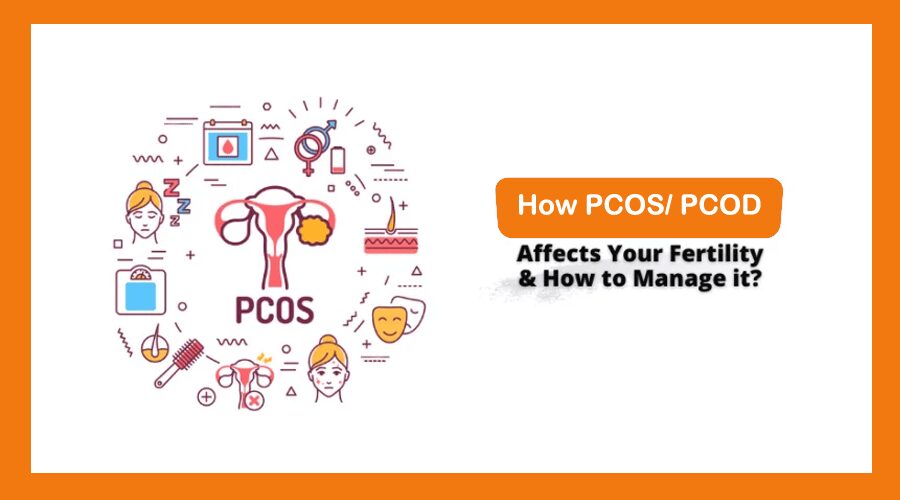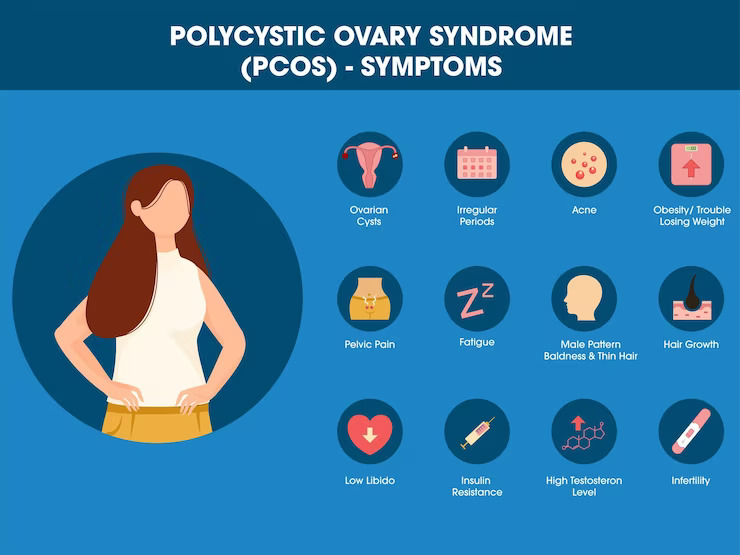Understanding PCOD and its impact on fertility

Introduction to PCOD and its impact on fertility
PCOD, or Polycystic Ovary Syndrome, is a hormonal disorder that affects many women. PCOD can have a significant impact on fertility, making it difficult for women to conceive. Understanding PCOD and its effects on fertility is crucial for women who are planning to start a family.
In this blog section, we will explore the common symptoms of PCOD, its causes and risk factors, and the available treatment options. By learning more about PCOD and its impact on fertility, women can make informed decisions and seek appropriate medical intervention if needed.
Key takeaways and resources for further information
- PCOD can have a significant impact on fertility, but there are treatment options available.
- Maintain a healthy lifestyle and seek medical help for managing PCOD-related infertility.
- Assisted reproductive technologies like IVF can be an effective option.
- Alternative therapies and support groups can provide additional resources and support.
- Consult with your healthcare provider for personalized advice and guidance on managing PCOD and improving fertility.
Begin your surrogacy journey with IVF Conceptions today!
Mobile: +91-8800481100 ( WhatsApp, Line, Viber)
Email: neelam@ivfconceptions.com
Web: www.completesurrogacy.com
 Introduction to PCOD and common symptoms
Introduction to PCOD and common symptoms
PCOD, or Polycystic Ovary Syndrome, is a hormonal disorder that affects many women. It is characterized by irregular periods, excess hair growth, acne, weight gain, and fertility problems.
These symptoms can vary in severity from woman to woman. It is important to recognize these symptoms as early as possible and seek medical guidance for appropriate diagnosis and treatment.
Understanding the impact of PCOD on fertility
PCOD can disrupt the hormonal balance in your body, leading to irregular ovulation and infertility. It can also result in the formation of cysts on the ovaries, affecting the release of eggs.
Causes and risk factors of PCOD
PCOD is caused by hormonal imbalances, which can be influenced by genetic factors and lifestyle choices such as poor diet and lack of exercise.
Additional Resources:
Everything You Need To Know (in 2023)
How Much Does Surrogacy Cost Using Family Member
Can My Insurance Provider Pay My Surrogacy Costs?
How Much Does Surrogacy Cost in the USA ( 2023)?
Surrogacy Costs Breakdown for Intended Parents
Hormonal imbalances and their relation to PCOD
Hormonal imbalances, particularly elevated levels of androgens (male hormones), are closely linked to PCOD. These imbalances disrupt the normal functioning of the ovaries, leading to the development of cysts and other PCOD-related symptoms.
Genetic and lifestyle factors contributing to PCOD
Genetic factors, such as family history, play a role in PCOD development. Additionally, lifestyle factors like poor diet, lack of exercise, and high stress levels can contribute to hormonal imbalances and increase the risk of PCOD. It’s important to address these factors for better management of PCOD and fertility concerns.
Diagnosis and treatment options
When it comes to diagnosing PCOD, your doctor may use a combination of medical history, physical exams, and blood tests. As for treatment, options may include lifestyle changes, medication to regulate hormones, and in some cases, fertility treatments such as IVF.
Diagnostic tests for PCOD
When diagnosing PCOD, your doctor may use a combination of medical history, physical exams, and blood tests. These tests help identify hormonal imbalances, insulin resistance, and other factors contributing to PCOD.
Medical and lifestyle management of PCOD-related infertility
When it comes to managing PCOD-related infertility, a combination of medical treatment and lifestyle changes can be beneficial. Your doctor may prescribe medications to regulate your menstrual cycle and address hormonal imbalances.
Additionally, adopting a healthy lifestyle, including regular exercise, a balanced diet, and stress management, can improve your fertility outcomes. It’s important to work closely with your healthcare team to develop a comprehensive treatment plan that suits your individual needs.
The psychological impact of PCOD on women
PCOD can have a significant psychological impact on women. Dealing with fertility concerns, body image issues, and emotional distress can take a toll on mental health. It’s important to seek support and counseling to cope with these challenges.
Emotional and mental health challenges associated with PCOD
Living with PCOD can bring about emotional and mental health challenges. Dealing with fertility concerns, body image issues, and hormonal imbalances can cause stress, anxiety, and even depression.
It’s important to seek support, whether through therapy, support groups, or talking to loved ones. Remember, you are not alone in this journey.
Coping strategies and support for women with PCOD
Living with PCOD can be challenging, but there are coping strategies that can help. Here are some tips: educate yourself about PCOD, maintain a healthy lifestyle, seek support from loved ones, join support groups, and consider therapy or counseling to manage emotions. Remember, you are not alone in this journey.
Fertility treatment options for women with PCOD
When it comes to fertility treatment options for women with PCOD, one common approach is Assisted Reproductive Technologies (ART) like In Vitro Fertilization (IVF). These procedures can help increase the chances of pregnancy for women with PCOD.
Consult a fertility specialist to discuss the best options for you. Remember, every woman’s journey is unique, and there are resources available to support you throughout the process.
Assisted reproductive technologies for PCOD-related infertility
If you’re struggling with infertility due to PCOD, one option you can consider is Assisted Reproductive Technologies (ART). These technologies, such as In Vitro Fertilization (IVF), can significantly increase your chances of getting pregnant.
Alternative therapies and complementary approaches
While there isn’t a cure for PCOD, some alternative therapies and complementary approaches may help manage symptoms and improve fertility. These include acupuncture, herbal remedies, and stress reduction techniques like yoga and meditation. Remember to consult with your healthcare provider before trying any alternative treatments.
Managing PCOD and fertility concerns
Managing PCOD and fertility concerns can be challenging, but there are various treatment options available. Consult with your healthcare provider for personalized advice and support on managing PCOD and improving fertility.
Conclusion
In conclusion, PCOD can have a significant impact on fertility, but there are treatment options available. Remember to consult with your healthcare provider for personalized advice and support.
If you’d like to learn more about IVF, Egg Donation, or surrogacy Consulting services globally, check out the rest of our website at IVF Conceptions. We offer legally secure and affordable surrogacy consulting services for FREE.
Our team has over 14 years of experience facilitating surrogacy arrangements, egg donation, and serving as an advocacy resource for infertile couples and LGBTQ individuals seeking to build families. Till now we have helped and supported thousands of the intended parents with their family-building journey, and we can help you as well. Happy to share the references from the past IPs if needed.
Begin your surrogacy journey with IVF Conceptions today!
Mobile: +91-8800481100 ( WhatsApp, Line, Viber)
Email: neelam@ivfconceptions.com
FAQs: Understanding PCOD and Its Impact on Fertility
1. What is PCOD?
PCOD (Polycystic Ovarian Disease) is a hormonal disorder that causes the ovaries to produce immature or partially mature eggs, leading to the formation of cysts. It can result in irregular menstrual cycles, hormonal imbalances, and fertility issues.
2. How does PCOD affect fertility?
PCOD impacts fertility by causing irregular ovulation or anovulation (absence of ovulation). This reduces the chances of natural conception as eggs may not mature and be released regularly for fertilization.
3. Is PCOD the same as PCOS?
No. PCOD (Polycystic Ovarian Disease) refers to the presence of multiple cysts in the ovaries due to immature eggs, whereas PCOS (Polycystic Ovary Syndrome) is a more severe metabolic condition that involves hormonal imbalances, insulin resistance, and potential long-term health complications.
4. Can women with PCOD still get pregnant?
Yes, women with PCOD can still get pregnant. Although the condition may make conception more challenging, fertility treatments such as ovulation induction, IVF, and lifestyle changes can significantly improve the chances of conception.
5. What are the common symptoms of PCOD?
Common symptoms include irregular menstrual cycles, weight gain, excessive facial hair, acne, thinning hair, and difficulty in conceiving.
6. Can lifestyle changes improve fertility in women with PCOD?
Yes, lifestyle changes such as maintaining a healthy diet, regular exercise, and managing stress can help regulate hormones, improve insulin sensitivity, and promote ovulation, which can increase fertility.
7. Are there any medical treatments available for PCOD?
Yes, medical treatments for PCOD include hormone therapy, medications to induce ovulation (such as Clomid or Letrozole), and treatments to regulate insulin levels. Consulting a healthcare provider is essential for personalized treatment.
8. Does PCOD increase the risk of miscarriage?
PCOD may increase the risk of miscarriage due to hormonal imbalances, insulin resistance, and poor egg quality. However, proper medical care and treatment can help manage these risks.
9. Can PCOD be cured?
While PCOD cannot be “cured,” its symptoms can be managed through lifestyle changes, medication, and fertility treatments. Many women with PCOD can conceive and manage symptoms effectively with the right interventions.
10. What role does weight play in PCOD and fertility?
Excess weight can exacerbate the symptoms of PCOD and reduce fertility. Losing even a small amount of weight (5-10%) can help regulate menstrual cycles, improve ovulation, and boost fertility outcomes.
These FAQs provide concise answers to common questions about PCOD and its impact on fertility, offering readers valuable insights into managing the condition.
More Resources:
- American Society for Reproductive Medicine (ASRM): https://www.asrm.org/
- The American Infertility Association (AIA): https://resolve.org/

 Introduction to PCOD and common symptoms
Introduction to PCOD and common symptoms


